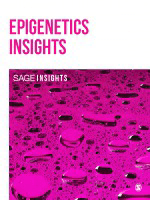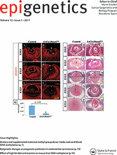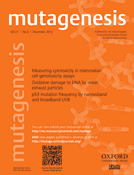
Epigenetics Insights
Scope & Guideline
Illuminating the Pathways of Genetic Expression
Introduction
Aims and Scopes
- Epigenetic Mechanisms in Health and Disease:
The journal explores the role of epigenetic modifications, such as DNA methylation and histone modification, in various health conditions and diseases, including cancers, neurodegenerative diseases, and metabolic disorders. - Environmental and Lifestyle Influences on Epigenetics:
Research published in the journal frequently investigates how environmental factors, lifestyle choices, and stressors impact epigenetic changes and subsequently influence health outcomes. - Translational Epigenetics:
A core aim is to translate epigenetic research into clinical practices, focusing on potential biomarkers for disease prediction, diagnostics, and therapeutic strategies. - Comparative Epigenetics:
The journal also emphasizes comparative studies across different species, including invertebrates and vertebrates, to understand evolutionary aspects and biological functions of epigenetic mechanisms. - Ethical Considerations in Epigenetic Research:
Epigenetics Insights addresses the ethical implications of epigenetic research, particularly concerning its application in clinical settings and public health.
Trending and Emerging
- Interdisciplinary Approaches to Epigenetics:
There is an increasing trend towards interdisciplinary research that combines epigenetics with fields such as environmental science, psychology, and nutrition, highlighting the complex interplay between genetics and external factors. - Epigenetics and Mental Health:
The journal has seen a rise in studies exploring the relationship between epigenetics and mental health conditions, particularly how stress and trauma can influence epigenetic modifications. - MicroRNA and Disease Biomarkers:
Research focusing on the role of microRNAs as potential biomarkers for various diseases is gaining traction, indicating a shift towards understanding their regulatory functions in health and disease. - Impact of COVID-19 on Epigenetic Research:
The COVID-19 pandemic has sparked interest in how viral infections and related stressors can lead to epigenetic changes, particularly in vulnerable populations such as pregnant women. - Epigenetic Aging and Longevity:
Studies investigating the concept of epigenetic age acceleration and its implications for longevity and age-related diseases are emerging as a significant theme, reflecting growing interest in the epigenetic aspects of aging.
Declining or Waning
- Basic Mechanistic Studies:
There has been a noticeable decrease in purely mechanistic studies focusing on fundamental molecular biology aspects of epigenetics, as the journal shifts towards more applied and clinical research. - Animal Models in Epigenetic Research:
Although animal models have been a staple in epigenetic studies, recent publications suggest a waning interest in this area, possibly as researchers focus more on human-related studies and clinical implications. - Ethnic and Demographic Specific Epigenetic Studies:
Research focusing on the epigenetic differences across various ethnic groups appears to be decreasing, as the journal may be prioritizing broader epidemiological studies that encompass larger populations.
Similar Journals

AGING CELL
Connecting Global Minds in Aging ResearchAGING CELL is a premier peer-reviewed journal published by Wiley, specializing in the rapidly evolving field of aging research and cell biology. Established in 2002 and enjoying an impressive track record as evidenced by its Q1 ranking in both Aging and Cell Biology categories for 2023, the journal has become a vital resource for researchers and professionals alike. With a significant impact factor highlighting its scholarly influence, AGING CELL offers an open access model since 2014, ensuring that groundbreaking research is accessible to the global community. The journal covers a wide array of topics related to the mechanisms of aging at the cellular and molecular levels, making it essential reading for anyone invested in understanding the complexities of aging processes and their implications for health and disease. With a broad international readership based in the United Kingdom and beyond, AGING CELL is dedicated to disseminating high-quality research that impacts scientific understanding and fosters advances in the field.

Nature Aging
Pioneering Knowledge in Geriatrics and NeuroscienceNature Aging, published by SPRINGERNATURE in Germany, stands as a premier journal dedicated to advancing the field of aging research. With high-ranking performance indicators, including a Q1 classification in Aging, Geriatrics and Gerontology, and Neuroscience (miscellaneous), this journal emphasizes the interdisciplinary nature of aging studies. Its Scopus rankings highlight its impact, achieving remarkable positions such as #1 in Neuroscience and #2 in both Geriatrics and Biochemistry for aging-related research. Although currently not open access, Nature Aging provides a wealth of cutting-edge research and critical reviews that aid researchers and practitioners in understanding the complexities of aging mechanisms and their implications. As the field continues to evolve from 2021 through 2024, this journal not only facilitates the dissemination of knowledge but also fosters innovative discussions that propel the science of aging forward. Join the vibrant community of scholars and professionals dedicated to solving the challenges associated with aging by engaging with the content published in Nature Aging.

EXPERIMENTAL AND MOLECULAR MEDICINE
Transforming insights into breakthroughs in clinical biochemistry.EXPERIMENTAL AND MOLECULAR MEDICINE, published by SpringerNature, is a premier open-access journal that has been at the forefront of biomedical research since its establishment in 1996. With a focus on innovative studies in biochemistry, molecular biology, and clinical biochemistry, the journal has consistently maintained a distinguished position within the top quartile (Q1) across multiple categories, underscoring its significant impact in these fields. The journal offers researchers and practitioners a platform for high-quality, peer-reviewed articles that advance our understanding of molecular mechanisms underlying health and disease. As a crucial resource for scholars seeking to explore cutting-edge research and practical advancements, its inclusion in relevant databases such as Scopus reflects an exceptional ranking with notable percentiles—placing it among the best in biomedical sciences. With a commitment to open access, EXPERIMENTAL AND MOLECULAR MEDICINE ensures that findings are readily available to the global academic community, facilitating collaboration and innovation in molecular medicine.

Epigenetics & Chromatin
Leading the Charge in Molecular Biology ResearchEpigenetics & Chromatin, published by BMC, is a leading open-access journal that has been at the forefront of research in the fields of genetics and molecular biology since its inception in 2008. With an impressive Q1 category ranking in both Genetics and Molecular Biology as of 2023, this journal is pivotal for researchers and professionals aiming to explore the complexities of gene regulation and chromatin dynamics. The journal is renowned for its commitment to disseminating high-quality research, featuring diverse articles ranging from original research to comprehensive reviews. It enjoys a significant impact within the academic community, evidenced by its Scopus rankings that place it among the top 30% of journals in Genetics and the top 40% in Molecular Biology. With a dedicated open-access model, Epigenetics & Chromatin ensures that its comprehensive content is readily accessible to researchers globally, fostering collaboration and innovation across the scientific landscape. Located in the UK, the journal continues to attract a diverse audience of scholars and practitioners passionate about understanding the intricate layers of epigenetic regulation.

Epigenetics
Pioneering Research for a Healthier TomorrowEpigenetics, published by Taylor & Francis Inc, is a leading journal in the fields of Cancer Research, Medicine (miscellaneous), and Molecular Biology. With an ISSN of 1559-2294 and an E-ISSN of 1559-2308, this journal has been paving the way for groundbreaking research since its inception in 2006, and it continues to play a crucial role in advancing our understanding of epigenetic mechanisms and their implications in health and disease. The journal is highly regarded, ranking in the Q1 category for Medicine and Q2 for both Cancer Research and Molecular Biology according to the 2023 category quartiles. Researchers and professionals in the field will find invaluable insights and innovative studies within its pages, making it an essential resource for those engaged in cutting-edge research. Although the journal is not open access, it encourages a comprehensive understanding through high-quality peer-reviewed content. With its creative exploration of the epigenetic landscape, Epigenetics serves as a vital platform for the sharing of knowledge that could lead to breakthroughs in treatments and therapies.

JOURNAL OF MOLECULAR MEDICINE-JMM
Championing High-Quality Research in Biomedical Science.JOURNAL OF MOLECULAR MEDICINE (JMM) is a premier publication dedicated to advancing the field of molecular medicine, encompassing critical areas such as drug discovery, genetics, and biochemistry. Published by Springer Heidelberg in Germany, this influential journal has established its significance within the academic community, achieving an impressive Q1 ranking across multiple categories as of 2023, including Drug Discovery, Clinical Genetics, and Molecular Medicine. With a focus on publishing high-quality research and novel insights, JMM appeals to a diverse audience of researchers, professionals, and students passionate about the molecular underpinnings of health and disease. The journal, which has seen a convergence of relevant research spanning from 1976 to 2024, is instrumental in showcasing groundbreaking studies that push the boundaries of knowledge in molecular therapeutics and biomedical science. While it does not offer open access, the rigor of its peer-reviewed content ensures that each publication is a valuable addition to the scientific discourse surrounding molecular medicine. For comprehensive studies and reviews that highlight the intersection of molecular biology and clinical application, look no further than JOURNAL OF MOLECULAR MEDICINE.

Journal of Inflammation Research
Uncovering the Mechanisms of Inflammation for Better HealthJournal of Inflammation Research, published by Dove Medical Press Ltd, is a premier open-access journal dedicated to advancing the field of immunology and allergy, with a particular focus on the biological mechanisms underlying inflammation. Since its inception in 2008, this journal has provided a vital platform for researchers to share their findings and foster collaboration within the global scientific community. With an impressive 2023 impact factor placing it in the Q2 category for both Immunology and Immunology and Allergy, the journal has consistently maintained its relevance and high academic standards, ranking #100 in Medicine (Immunology and Allergy) and #118 in Immunology (Immunology and Microbiology) according to Scopus metrics. The E-ISSN 1178-7031 allows for easy access to a plethora of pioneering research articles, reviews, and clinical studies that address contemporary issues in inflammation and immunity. As a leading resource for researchers, professionals, and students alike, Journal of Inflammation Research is committed to facilitating the dissemination of groundbreaking discoveries that contribute to improved therapeutic strategies and health outcomes.

BIOMEDICAL RESEARCH-TOKYO
Exploring Pioneering Research in Biochemistry and GeneticsBIOMEDICAL RESEARCH-TOKYO is an esteemed interdisciplinary journal published by BIOMEDICAL RESEARCH PRESS LTD, dedicated to disseminating pioneering research and advancements in the fields of biochemistry, genetics, and medicine. Since its inception in 1980, the journal has established itself as a reputable source of knowledge, contributing significantly to the global scientific community with its strong emphasis on innovative findings and methodologies. With a consistent presence in the Q3 quartile for both Biochemistry, Genetics and Molecular Biology and Medicine categories as of 2023, it continues to attract a diverse range of research articles. While the journal does not operate as an open access platform, it remains an essential resource for researchers, professionals, and students seeking to further their understanding of biomedical sciences. Located in Sapporo, Japan, this journal fosters collaboration and knowledge sharing among the international biomedical research community, engaging readers through its compelling studies that span from 1980 to 2024.

CELLULAR & MOLECULAR BIOLOGY LETTERS
Advancing the Frontiers of Cellular and Molecular ScienceCELLULAR & MOLECULAR BIOLOGY LETTERS, published by BMC, is a premier open-access journal dedicated to disseminating high-quality research in the fields of Biochemistry, Cell Biology, and Molecular Biology. Established in 1996, the journal has emerged as a leader in its domain, boasting an impressive Q1 ranking across three critical categories as of 2023, reflecting its significant impact within the scientific community. With an ISSN of 1425-8153 and an E-ISSN of 1689-1392, it offers accessible research findings to a global audience, having been open access since 2013. Situated in the United Kingdom, at CAMPUS, 4 CRINAN ST, LONDON N1 9XW, the journal continues to serve as a vital resource for researchers, professionals, and students, contributing to advancements in the understanding of cellular and molecular processes. By providing a platform for original research, reviews, and short communications, CELLULAR & MOLECULAR BIOLOGY LETTERS plays a crucial role in fostering dialogue and collaboration within the scientific community.

MUTAGENESIS
Advancing knowledge in mutagenic processes for a healthier tomorrow.MUTAGENESIS, published by Oxford University Press, is a leading journal in the fields of genetics, toxicology, and health, dedicated to advancing our understanding of mutagenic processes and their implications for human health. With an ISSN of 0267-8357 and an E-ISSN of 1464-3804, this journal has been at the forefront of mutagenesis research since its inception in 1986 and will continue to publish cutting-edge studies until 2024. Holding an impressive position in the academic community, MUTAGENESIS is ranked Q2 in Genetics, Q2 in Clinical Genetics, Q2 in Health, Toxicology, and Mutagenesis, and Q1 in Toxicology, reflecting its commitment to high-quality scholarly work. The journal enjoys a robust global readership, with significant rankings in various Scopus categories, including top positions in Environmental Science and Clinical Genetics, ensuring that it remains a vital resource for researchers, professionals, and students alike. While access to its articles is not completely open, MUTAGENESIS provides valuable insights that fuel innovative research and drive forward the understanding of genetic risks and toxicological assessments.